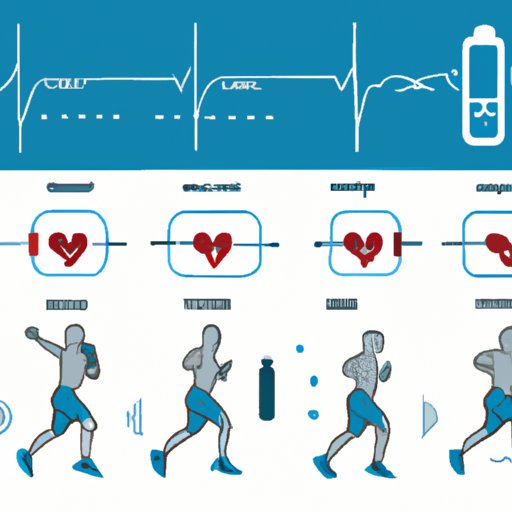Introduction
Exercise is an important part of a healthy lifestyle. Not only does it help to keep us fit and active, but it also has a number of beneficial effects on our cardiovascular system. One of the most noticeable changes that occur during exercise is an increase in heart rate. But why does this happen? In this article, we will explore the physiological and psychological reasons why your heart beats faster when you exercise.
Exploring the Physiological Causes of Increased Heart Rate During Exercise
The heart rate increases during exercise because of several physiological processes. The first is an increase in cardiac output, which is the amount of blood pumped by the heart per minute. This increase is necessary to meet the increased demands of the body during exercise, such as supplying oxygen and nutrients to the working muscles.
The second reason for an increased heart rate during exercise is the effect of oxygen utilization. During exercise, the body needs more oxygen than it would at rest. The increased demand for oxygen causes an increase in the heart rate in order to supply the required oxygen to the working muscles.
Examining How Exercise Affects Heart Rate and Blood Pressure
Exercise also affects heart rate and blood pressure in other ways. One of these is an increase in stroke volume, which is the amount of blood pumped out of the heart per beat. When the heart rate increases, the stroke volume also increases, allowing the heart to pump more blood with each beat. This increases the amount of oxygen and nutrients supplied to the muscles and organs.
In addition, exercise can cause an increase in systolic pressure, which is the highest pressure exerted in the arteries. The increased pressure is necessary to move the increased amount of blood through the body. As a result, the heart must work harder to maintain the increased pressure, resulting in an increased heart rate.
Understanding the Role of Cardiovascular Adaptation in High-Intensity Workouts
High-intensity workouts, such as sprinting or interval training, can cause even greater increases in heart rate. This is due to the body’s ability to adapt to the increased demands of exercise. During high-intensity workouts, the body releases hormones such as adrenaline and noradrenaline, which increase the heart rate and blood pressure in order to meet the increased energy demands.
Regular exercise can also have a positive effect on overall cardiovascular health. Regular exercise helps to strengthen the heart muscle, making it more efficient at pumping blood throughout the body. This can lead to lower resting heart rates, as well as improved blood pressure levels.
Investigating How Exercise Affects the Autonomic Nervous System
The autonomic nervous system plays an important role in regulating heart rate during exercise. The autonomic nervous system is divided into two parts: the parasympathetic and sympathetic nervous systems. The parasympathetic nervous system is responsible for slowing the heart rate, while the sympathetic nervous system is responsible for increasing the heart rate.
During exercise, the sympathetic nervous system is activated, causing an increase in heart rate. This is necessary to supply the increased oxygen and nutrient demands of the body. The parasympathetic nervous system is then activated after exercise, causing the heart rate to return to its resting level.

Analyzing the Benefits of Regular Exercise on Heart Health
Regular exercise can have a number of beneficial effects on heart health. Regular exercise helps to strengthen the heart muscle, making it more efficient at pumping blood throughout the body. This can lead to improved heart function, as well as a reduction in the risk of heart disease.
Regular exercise can also help to improve blood pressure levels. This is due to the increased efficiency of the heart, as well as the reduced stress levels associated with regular exercise.

Comparing the Effects of Moderate and Intense Exercise on Heart Rate
The effects of different types of exercise on heart rate can vary. Moderate exercise, such as walking or jogging, will typically cause a moderate increase in heart rate. Intense exercise, such as sprinting or HIIT workouts, can cause a much greater increase in heart rate.
The long-term effects of different types of exercise on heart rate can also vary. Moderate exercise can help to strengthen the heart muscle, leading to improved heart function and lower resting heart rates. Intense exercise, on the other hand, can lead to an increase in resting heart rate over time.

Exploring the Relationship Between Heart Rate and Oxygen Utilization During Exercise
Another factor that affects heart rate during exercise is oxygen utilization. Oxygen utilization is the amount of oxygen used by the body during exercise. During exercise, the body needs more oxygen than it would at rest. The increased demand for oxygen causes an increase in the heart rate in order to supply the required oxygen to the working muscles.
The effects of different types of exercise on oxygen utilization can also vary. Moderate exercise, such as walking or jogging, will typically cause a moderate increase in oxygen utilization. Intense exercise, such as sprinting or HIIT workouts, can cause a much greater increase in oxygen utilization.
Conclusion
In conclusion, there are a number of physiological and psychological reasons why your heart rate increases when you exercise. These include an increase in cardiac output, oxygen utilization, and the activation of the autonomic nervous system. Regular exercise can also have a number of beneficial effects on overall heart health, including improved heart function and reduced risk of heart disease. Finally, the effects of different types of exercise on heart rate and oxygen utilization can vary, so it is important to choose an exercise regimen that is appropriate for your fitness level.
Overall, it is clear that exercise has a number of beneficial effects on the cardiovascular system. Understanding how exercise affects your heart rate can help you to make informed decisions about your fitness routine. With this knowledge, you can ensure that you get the most out of your workouts and stay healthy for years to come.


